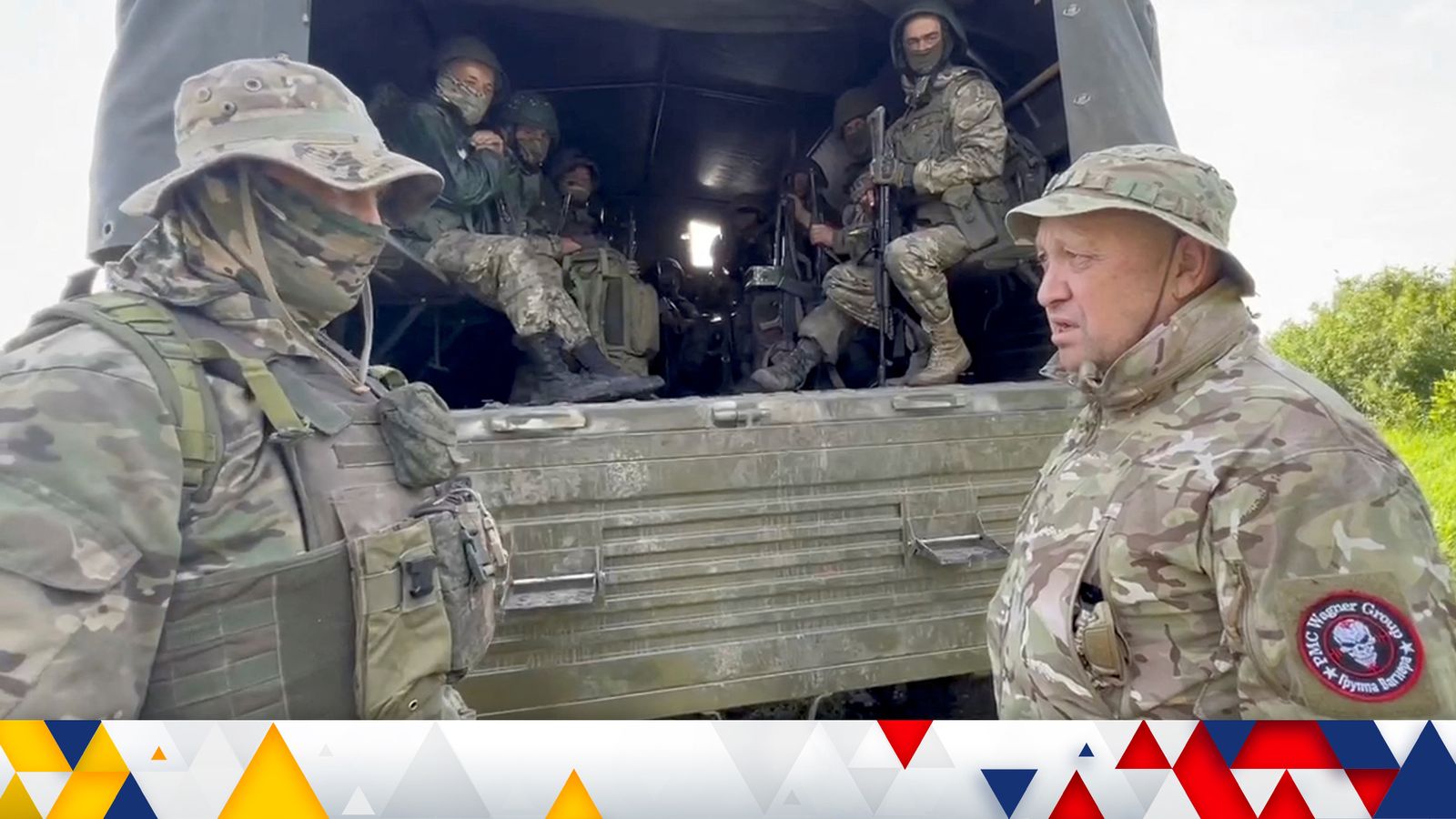Ranting Wagner boss Yevgeny Prigozhin may recognise his influence is on the wane

There is by now a degree of predictability to Wagner boss Yevgeny Prigozhin’s outbursts.
Cause maximum outrage, swear a lot, declare that this is the point of no return and then, somewhat miraculously, settle with the warring party which is invariably Russia’s Ministry of Defence.
Thus it was in the fight over ammunition, when Prigozhin declared his forces ready to quit the battle for Bakhmut unless he was given the ammunition he needed.
He clearly received some, and he stayed.
Ukraine war latest – fears Russia is mapping undersea energy infrastructure
This past week he has been railing against signing a contract to bring his forces under the direct control of Russia’s armed forces.
On Friday, after comments from Vladimir Putin that signing was mandatory, Prigozhin arrived in Moscow with a contract of his own which, in effect, tries to formalise Wagner as an equivalent but separate military force to the Russian army.
He wants a guaranteed supply of weapons and ammunition, the personal participation of Defence Minister Sergei Shoigu in all Wagner meetings and a Wagner representative to serve as Shoigu’s deputy.
He also wants criminal investigations of commanders he deems responsible for the deaths of Wagner troops because of a lack of kit.
Advertisement
It is unlikely Shoigu – or indeed Putin – will agree to any of that.
The stand-off continues.
Prigozhin likes to aim high but this may be an act of desperation as he recognises his influence is on the wane.
“Just before the Ukrainian counteroffensive there was this idea that Wagner was the only really capable military unit on the Russian side,” said Andrei Soldatov, a Russian journalist and expert on the country’s security services.
“Now we see Wagner is not playing a really big role in the counteroffensive, the Russian army is getting more prominent and people aren’t talking about Prigozhin as much as we did just a month ago.”
Divide and rule is the Russian president’s modus operandi.
Play Prigozhin off against Ramzan Kadyrov, the Chechen leader (who has signed the army contract); play Prigozhin off against the Russian Ministry of Defence to make sure no one gets ideas too big for their station.
But Prigozhin has been extremely careful, barring one possible slip which he was quick to correct, not to criticise the Russian president directly.
“He is a product of the Kremlin,” said Andrei Kolesnikov of the Carnegie Russia Eurasia Centre.
“He can be against part of the elite but at the same time, if he were against Putin, he would disappear overnight.”
Disappear not in the sense of assassination, more an assimilation into the bureaucracy that Prigozhin loves to hate.
Read more:
From hot dog seller to mercenary leader: The rise of Prigozhin
How village was held captive by Russian troops below ground
Prigozhin understands what’s needed of him in the Putin system, whether that is by way of internet trolls, mercenaries pushing through the Kremlin’s agenda in far-flung corners of the world or setting the precedent for convict-based cannon-fodder.
Recently he has been touring the Russian region, talking all about the need for further mobilisation, both militarily and economically.
Knowing the state of the battlefield better than most, he may recognise that Putin will be forced to call for another round of mobilisation in the not too distant future.
Either way, seeding the idea can’t hurt.
Please use Chrome browser for a more accessible video player
11:04
Ukrainian village’s ’28 days in hell’
“This is a kind of ‘meet the people’ for Prigozhin, should the political technologists in the Kremlin decide that it’s worth having him as head of an ultra-patriotic political party,” said Mark Galeotti, security analyst and director of Mayak Intelligence.
“He realises that his role in charge of Wagner, or at least Wagner in Ukraine, is beginning to come to an end, that Shoigu is not going to let him continue as before.”
Shoigu is clearly more wily than Prigozhin gives him credit for.
The ball is now in his court.
What is noticeable is how small a role the commander-in-chief has been playing in all the back-and-forth between Wagner and the defence ministry, wary of destabilising things with the Ukrainian counteroffensive underway.
If Prigozhin is the kid screaming in the playground, (a very dangerous one at that), then Putin is the rabbit caught in the headlights.
“Putin at the moment has been doing everything he can to avoid making tough decisions,” said Mr Galeotti.
“To actually deal with Prigozhin would be a tough decision and when he’s faced with a tough decision, Putin tries to duck it.
“He hopes it’ll go away and then eventually, if he has to make it, he tends to make it badly and late.”